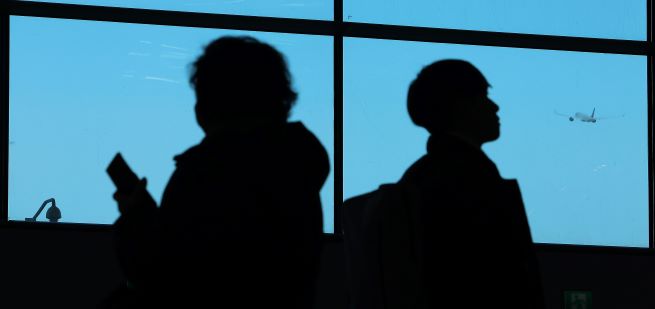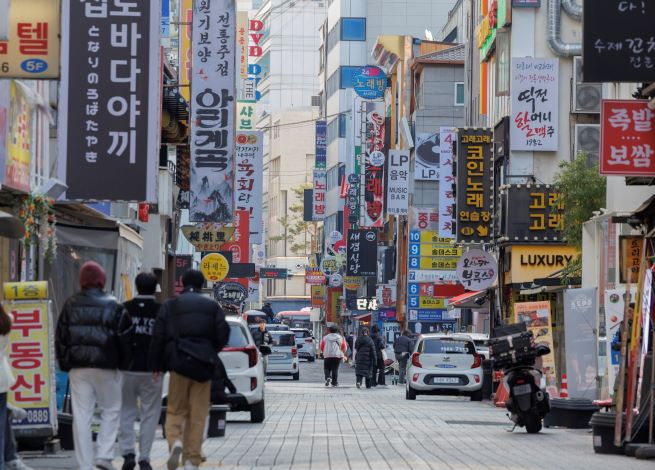
Following the conclusion of the national mourning period for the Jeju Air Flight 2216 tragedy, which resulted in 179 fatalities, South Korea’s major travel agencies are resuming marketing activities, including special promotions and exhibitions, in anticipation of the upcoming Lunar New Year holiday. The photograph, taken on January 7, shows an aircraft taking off behind passengers at Incheon International Airport’s Terminal 2. (Yonhap)
SEOUL, Jan. 12 (Korea Bizwire) — South Korea’s decision to designate January 27 as a temporary public holiday has extended the Lunar New Year break to six consecutive days, sparking a surge in travel demand while causing concerns among small business owners in the food and beverage industry.
The travel industry is witnessing a sharp increase in overseas bookings, especially for long-haul destinations in North America and Europe. Travel agency ‘Very Good Tour’ reported that over 80 new bookings were made on January 8 alone following news of the additional holiday.
Interest in travel packages for the extended holiday period has significantly grown, with European destinations accounting for 14% and North American destinations for 5% of new reservations.
The extended break also encourages spontaneous travel plans. A 30-something office worker in Seoul shared, “I couldn’t plan a trip earlier due to work constraints, but with the new holiday, I’m considering a quick trip to Japan.”
Previous temporary holidays, such as during Chuseok in 2023 and Armed Forces Day in October 2024, saw similar spikes in travel demand. Kyowon Tour reported a 20% rise in new bookings during those periods, and Mode Tour saw a 45% weekly increase in reservations when last year’s Armed Forces Day was declared a holiday.
To capitalize on the travel boom, agencies are launching promotional campaigns. Mode Tour is offering up to 100,000 KRW in discounts for bookings made between January 22 and February 1 for remaining seats on holiday flights.
Concerns for Small Businesses
However, small business owners in urban office districts are worried about declining sales. A cafe owner in Seoul’s Gangnam district lamented, “Weekends and holidays are usually quiet here. With Monday off, it seems like another day of lost revenue. I’m even considering closing during the break.”
Restaurants in residential areas share similar concerns. A Chinese restaurant owner in Seoul’s Eunpyeong district commented, “While some can enjoy the holidays, small business owners like us face tough times. Extended holidays drive people overseas, leaving local eateries struggling.”
Franchise owners in regional areas also expressed anxiety. One owner in South Gyeongsang Province noted, “With the economy already sluggish, more people traveling abroad during a long holiday could further hurt sales.”
Hope Amidst Challenges
Despite these worries, some in the food industry remain cautiously optimistic. One restaurant industry insider said, “We are hopeful that more people dining out during the long break will offset potential losses.”
Ryu Pil-seon, a senior advisor at the Korea Federation of Micro Enterprises, predicted mixed effects. “Local tourist spots may benefit, but office districts in cities like Seoul will inevitably suffer. The long holiday could revitalize consumer spending, but government measures to stimulate the economy during this period will be crucial.”
The extended Lunar New Year holiday reflects both the promise of economic stimulation through increased travel and consumption and the challenges faced by small businesses bracing for potential revenue declines.
Lina Jang (linajang@koreabizwire.com)
 Mind Uncharted Explore. Discover. Learn.
Mind Uncharted Explore. Discover. Learn.





